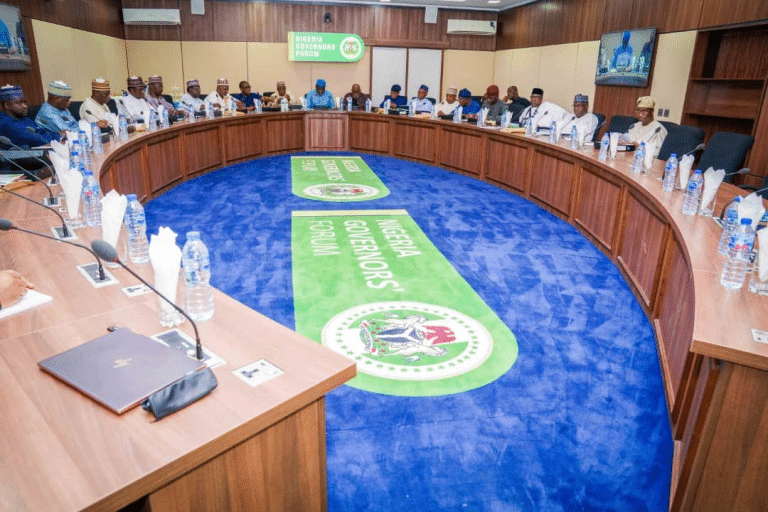Governors from Southern Nigeria, under the aegis of the Southern Governors’ Forum, have urged that the new minimum wage be tailored to each state’s financial capacity. This call comes amid ongoing discussions by the Nigerian Governors’ Forum (NGF) to find a mutually agreeable solution to the minimum wage crisis.
Despite President Bola Tinubu’s unusual presence at the National Economic Council (NEC) meeting, traditionally chaired by Vice President Kashim Shettima, neither addressed the minimum wage issue. Meanwhile, organized labor has raised alarms about growing restiveness among workers over the delay in concluding the new wage agreement, with calls for industrial action escalating.
In a 16-point communique issued on Thursday, the Southern Governors’ Forum advocated for each state to negotiate its minimum wage with labor unions. “The Forum discussed the minimum wage issues demanded by labor and unanimously agreed that the minimum wage should be reflective of the cost of living and that each state should be allowed to negotiate its minimum wage,” the communique read.
Following a meeting of the NGF in Abuja, the 36 state governors promised to remain dedicated to the process and assured that better wages would result from ongoing negotiations. Governors from Oyo, Zamfara, Anambra, Delta, Gombe, Kano, Imo, Kwara, Ondo, Kaduna, Kebbi, Ebonyi, Sokoto, and Ogun States, among others, attended the meeting. Deputy governors from Akwa Ibom, Osun, and Borno States were also present.
The NGF, in a communique signed by its chairman and governor of Kwara State, AbdulRahman AbdulRazaq, stated: “The Forum discussed the new national minimum wage. The governors agreed to continue engaging with key stakeholders to reach a mutually agreeable solution. We remain dedicated to the process and assure that better wages will result from the ongoing negotiations.”
President Tinubu had earlier established a tripartite committee to negotiate a new minimum wage for workers. However, the committee, comprising organized labor, federal and state government representatives, and the Organized Private Sector (OPS), failed to reach an agreement, prompting labor to declare an indefinite strike on June 3, 2024.
The strike disrupted various sectors, including airports, hospitals, banks, and legislative assemblies. Although the strike was suspended on June 4, 2024, following assurances from President Tinubu, negotiations remain deadlocked. Labor initially demanded N494,000, later reducing it to N250,000, while the government raised its offer from N60,000 to N62,000.
In his Democracy Day speech on June 12, 2024, President Tinubu assured that an executive bill on the new national minimum wage would soon be sent to the National Assembly for passage. However, workers in both the public and private sectors are growing increasingly impatient, urging labor leaders to take action.
A labor leader from the public sector unions expressed frustration: “The suffering and hardship brought about by government policies, especially the removal of subsidies, has worsened conditions. Many of the state governors are not paying palliatives, and even the federal government has not been consistent in its payment.”
Similarly, private sector workers echoed these sentiments, citing the compounded issues of foreign exchange crises and increased electricity tariffs. “The workers are becoming very restive and are urging us to take action, including industrial action, to quicken the resolution,” a labor leader from the sector said.
Speaking on the restiveness, Prince Adewale Adeyanju, a member of the Tripartite Committee on the New Minimum Wage, appealed for patience, noting that the process of sending the bill to the National Assembly was ongoing and arrears would eventually be paid.
The Senior Staff Association of Nigerian Universities (SSANU) also expressed dissatisfaction with the delay. SSANU President, Comrade Mohammed Ibrahim, criticized President Tinubu for not expediting consultations with stakeholders before the committee submitted its report. “The least we expected is this unnecessary delay. Consultation should have been at this level before the tripartite committee started,” he said.
Ibrahim emphasized the need for quick resolution: “Nigerian workers are feeling the heat more than any other person because we are the ones that oil the engine of the economy. If you are expecting the best from the workers, you should be able to take care of their welfare and well-being.”
As tensions rise, all eyes are on the President to expedite the minimum wage discussions and provide relief to the Nigerian workforce.

